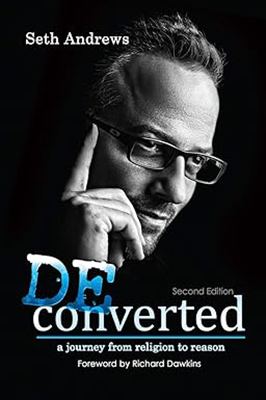Deconverted
“Deconverted: A Journey from Religion to Reason” is a memoir by Seth Andrews, published in 2012. Andrews, a former Christian broadcaster and evangelical, shares his personal journey of questioning and ultimately leaving his faith behind. Here’s a summary:
Main Themes:
Personal Journey: Andrews recounts his upbringing in a devout Christian family and his immersion in evangelical Christian culture. He describes his experiences as a believer, including his involvement in church activities, evangelism, and ministry, as well as his struggles with doubt and skepticism.
Crisis of Faith: Andrews discusses the events and experiences that led him to question his beliefs and ultimately reject Christianity. He reflects on his encounters with science, philosophy, and critical thinking, as well as his growing awareness of inconsistencies and contradictions within the Bible and Christian doctrine.
Leaving Religion Behind: Andrews shares the process of deconversion, including the emotional and psychological challenges of leaving behind a deeply ingrained belief system. He describes the sense of liberation and empowerment he experienced upon embracing atheism and rejecting supernatural beliefs.
Navigating Relationships: Andrews explores the impact of his deconversion on his relationships with family, friends, and colleagues. He discusses the difficulties of coming out as an atheist in a religious community and the tensions and conflicts that can arise from differences in belief.
Key Concepts:
– Critical Thinking: Andrews emphasizes the importance of critical thinking, skepticism, and intellectual honesty in evaluating religious beliefs and claims. He encourages readers to question authority, challenge assumptions, and seek evidence-based answers to life’s big questions.
– Secular Humanism: Andrews embraces secular humanism as a positive alternative to religious belief, emphasizing the value of reason, compassion, and ethical living. He argues that a secular worldview provides a solid foundation for morality and meaning without the need for supernatural explanations.
– Community and Support: Andrews discusses the importance of finding community and support as a nonbeliever, whether through online forums, local atheist groups, or secular organizations. He emphasizes the importance of building connections with like-minded individuals and finding acceptance and validation outside of religious communities.
Legacy:
“Deconverted” has resonated with readers who have undergone similar journeys of questioning and leaving behind religious belief. Andrews’s candid and relatable storytelling, combined with his insights into the process of deconversion, have made the book a valuable resource for atheists, skeptics, and freethinkers seeking validation and understanding. The book has contributed to ongoing conversations about faith, reason, and the human experience of leaving religion behind.

